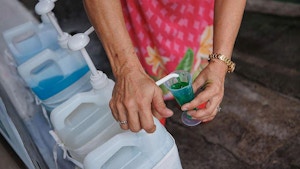#Global Plastics Treaty Berita

Though disproportionately affected by plastic pollution, Indigenous Peoples are struggling to shape a global treaty on it.

The next round of plastics treaty negotiations will take place in Switzerland in August, after countries failed to agree on the rules in South Korea in December.

Studio EB
Upstream interventions for waste reduction are currently underfunded compared to downstream solutions like recycling and recovery, which developing countries may lack capacity for. Financing must support a just transition for informal waste workers, NGOs urge.

Karbon & Iklim
‘Climate villains’ that made headlines in 2024
Exploitation in the mining sector gave rise to the term "blood nickel", while ad agencies were in the spotlight for working with fossil fuel giants. Here are the individuals and organisations that made the headlines for the wrong reasons.
#Global Plastics Treaty Opini

Biopolymers that are cheaper to produce, heat-resistant, biocompatible and biodegradable are promising alternatives to plastics.

As lobbyists flood plastic treaty talks, negotiators must uphold the rule of law to prevent corporate capture, including existing guidelines to stop the tobacco industry — a major source of plastic waste — from influencing policies.

The region can shape the Global Plastics Treaty if it maintains its momentum from COP16, where the Philippines, Malaysia and Indonesia called for the inclusion of Indigenous peoples rights and stronger collaboration on biodiversity finance.

A Malawian campaigner and scientist at the UN INC4 negotiations in Ottawa sets out four tests for the global plastic treaty.
#Global Plastics Treaty Rilis Pers

Global Alliance for Incinerator Alternatives (GAIA)
GAIA calls for greater accountability, inclusiveness, transparency in Plastics Treaty Process

UN Environment Programme (UNEP)
World must pull together to build a fairer, more sustainable planet: UNEP annual report



